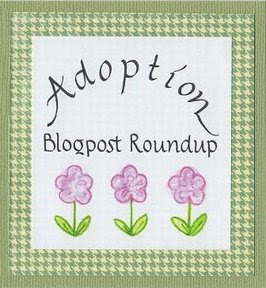Non-traditional (that is, non-bio) parents all experience it sometime: the clutch in the pit of the stomach the day their adopted children look up with big, trusting eyes, asking to know the story of how they came to be... where they came to be.
Depending on their ages, we instinctively shield them from the less palatable parts of the story - especially the parts that are potentially damaging to their budding little selves. A six-year-old does not need to be reminded of the gruesome details that led him to be taken away from his birth parents. And a four-year-old may simply be seeking the assurance that she, like other children, was loved continuously even before we held her in our arms for the very firsttime.
The subject may come up in unexpected ways. Not long ago we were watching a movie that showed the maternity ward of a hospital, and six-year-old Christopher piped up. "Look! It's a baby store!" He was silent for a time, then said thoughtfully. "I guess the wrong parents picked me out the first time. That's why my angel brought me to you."
I couldn't have said it better myself, though I realize that in time he will have to wrestle with the complications of actual biology: How the parents who gave him life were not also the ones who showed him how to live it. At that point, he will have to decide who his "real" parents are.
The temptation, of course, is to do everything in our power to influence that perception so as to tip the scales in our favor. After pouring my heart and soul into these two children for over a decade, I imagine I would be devastated if in the end they decided (as did one of my adopted acquaintances) that biology trumps all, and that they were robbed of their "real" parents. I pray that this does not happen - and yet, the possibility would not justify my unnecessarily "poisoning the well" against the birth parents.
We must resist the temptation to treat our children's affections as a prize to be won, for this is the best way to ensure that everyone loses - especially our children.
Without misrepresenting the truth, we must make every effort to speak of birth parents with respect, knowing that our children will always be profoundly tied with these biological relations, in ways they themselves may not admit or even recognize. "Non-traditional" parents, including stepparents and custodial grandparents, are unwise to disregard or minimize this fact.
Whenever possible, we need to help our children find ways to honor their origins, whatever they might be. Some ideas to consider:
· There are times when it is inadvisable for a child to continue to have contact with his birth family - and yet, he may have strong feelings about breaking this connection that he cannot resolve by himself. We need to find ways to help him work through these feelings. As Catholics, our faith can provide a source of comfort and connection for the child: On Mother's Day (or Father's Day), light a candle at church in honor of the birth parent(s), and encourage the child to ask his spiritual mother, Mary, to watch over his birth mom.
· Have a special family day that embraces the significant milestones of origin: his birthday, his adoption day, and his birthday in the Church (baptism).
· Create a special album with pictures and letters or other mementoes from all the adults who love him - both adoptive and biological grandparents and other relatives, godparents, birthparents, stepparents, etc.
· Each year on a specific day (such as the child's birthday) write a letter to the birthparent, noting significant milestones and memories. You may decide to send the letter, or keep it in a special album to give the child when he turns 18.
· Consider creating an adoption "time capsule," a special box or album with mementoes fromyour adoption trip that is set aside, to be opened when the child is mature enough to want specifics on his adoption story. Include labeled pictures of anyone associated with the adoption (such as the caseworker), and a copy of any journal entries you may have made during the process. In the case of foreign adoptions, include samples of music, recipes, and unique samples of handiwork from the country. Protect irreplaceable documents and pictures in a safe-deposit box.
Wednesday, April 18, 2007
Subscribe to:
Post Comments (Atom)












 My StumbleUpon Page
My StumbleUpon Page



 border="0">
border="0">
















No comments:
Post a Comment